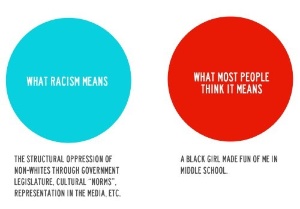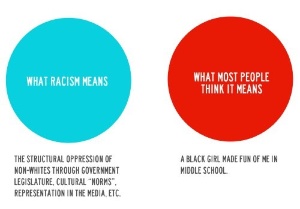CherryBlossom
Shiny_Rock
- Joined
- Jan 20, 2011
- Messages
- 311
aviastar|1307734868|2942766 said:CherryBlossom|1307579116|2941151 said:
Are we really limiting the definition of racism to the acts or beliefs of white people only? Racism is an belief or doctrine based on preconcieved ideas associated with the color of one's skin, regardless of what color your own skin is or the color of the group you have pre-judged.
I understand the point of the graphic, and agree with it in principle- that we often limit our definitions of racism to conform with our own behavior landing in the 'acceptable' range- and there is certainly the argument (nay, fact, in the US) that the most common form of racism is white judging black. But are there not numerous sad examples of genocides, throughout ancient and recent history, around the world that do not involve white populations at all?
Racism in any form- from any person or group against another- is abhorrent. Let us not overlook that any person of any group is capable of behaving so badly, and any one displaying such ignorance should be called on it.
Which, I don't think, has anything to do with being friends with people with varying political views. The key here is not what you believe, but your abilty to engage in civil discourse. Racist are racists, no matter their political stripe, and are generally incapable of calm, informative discussions because of their limited tolerance for any other viewpoints. But I will be friends with anyone of varying political views if we can have a conversation that never devolves into name calling, snide remarks, or general nastiness. In fact, my (politcally and religiously diverse) group of friends regularly has Pizza n' Politics get togethers that end with smiles, hugs, and laughter.
It's a beautifully diverse world out there, I would hate to stem the flow of information or my own personal growth by limiting my interactions to people who only agree with me.
I stand by what the graphic states in relations to racism here in the United States. Institutionalized racism has only existed when it's perpetuated by white people towards non-white people.
BTW I don't use the word "white" when talking about Europeans. I think that only people in North America can be "white" - folks w/ the same color coming from Europe cannot be white according to the historical definition of the word.
I believe that people from different racial backgrounds can be PREJUDICED towards another i.e "black girl made fun of me for being white" - but racism and being prejudiced are two different things.
I've been doing a lot of reading on the topic over the last few days/weeks and this is the definitions that work for me.
Virginia records document ten servant revolts in the mid 1600’s, culminating in the famous Bacon’s Rebellion of 1676. African and English servants, free workers and farmers, demanded land and pay for their labor. They burned down Jamestown, the colony’s capital. Colonial rulers had to call in the British army to subdue the rebellion, Colonial landowning legislators responded with a series of Slave Codes enacted from 1680 through 1705. These codes legalized chattel slavery (the child of an enslaved woman would be enslaved for a lifetime) and severely restricted the rights of free Africans. The codes equated the terms “slave” and “Negro,” thus institutionalizing the world’s first system of racialized slavery.
The codes also set out the “rights” of and restrictions for “servants.” At first, servants” referred ambiguously to both Africans and English. But as “slave” became synonymous with “Negro,” (the Spanish word for “Black,”) “servant” came to mean “white,” the term which replaced “English,” “Christian” or “wench” to refer to poor or indentured Europeans. As the codes tightened the legal noose around enslaved Africans, they simultaneously loosened the legal bonds on En-glish indentured servants. English or “white” servants were granted specific forms of privilege or preferential treatment which was specifically denied to slaves, or “Negroes.” For example, the codes stipulated that servants could challenge unjust behavior of their masters in court; servants, both men and women, were entitled to specific “freedom dues,” paid in tobacco (the legal tender of the colony) when their term of servitude was over. Servants could get a small plot of land, provided they promised to guard the frontiers. Poor white males were offered the first paid jobs in the colony— on the slave patrols. They got bounties for every slave they caught.
All these “privileges” were specified as being available only to “white” people. However, if any poor whites acted in solidarity with any Africans, they would be physically branded, and their privileges removed. Thus the term white became synonymous with privilege in colonial law. In conclusion, a study of the historical origin of the term white suggests that: “White” is a political term. It was specifically created by colonial rulers to prevent oppressed people from different continents from uniting to confront their common oppressors. “White privilege” is a relational term. It is the other side of the coin of racial oppression. In the U.S. white supremacy system, they go together. White was originally a class term. Theprivileges of whiteness were first granted by the colonial ruling class only to the poor and servant class of Europeans.
Colonial rulers did not need privilege. They had power. In a few generations, the institutional privileges for the white poor would wipe out the material basis for unity with oppressed Africans, as their daily lives grew further apart. (Bacon’s Rebellion was the last multiracial revolt of the oppressed during the colonial era.)
Colonial rulers used the existence of these privileges to convince poor white people that the little they had was due to their racial superiority, rather than to preferential treatment combined with hard work. The impact of white privilege on white people’s daily lives reinforced the ideology of white arrogance and “legitimized” their dehumanization of people of color.
In summary, the system of white privilege for non-ruling class whites reinforces the system of racial oppression against people of color. And the complementary systems of white privilege and racial oppression maintain the system of white power for ruling class whites.
This web of institutional and cultural preferential treatment is called white privilege. In a white supremacy
system, white privilege and racial oppression are two sides of the same coin.” Non-ruling class white people are both oppressed and privileged. They are oppressed most significantly on the basis of class, gender and sexuality, and also on the basis of religion, culture, ethnicity, age, physical abilities and politics. At the same time, they are privileged in relation to peoples of color.





300x240.png)